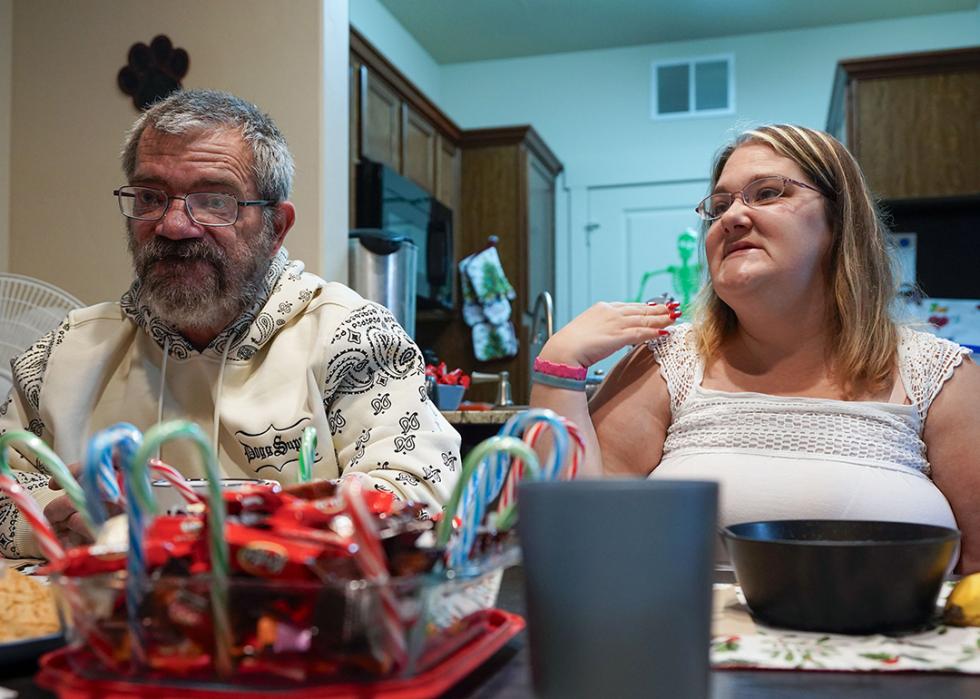'Ruined them for a baby': Birth mother facing eviction after she says Utah adoption provider took back offer for thousands in cash

Perzia and Muth have been living in the one-bedroom apartment in Layton since July.
Over the months, and with the promise of thousands in cash to begin anew, they bought decorations—many butterfly-themed, Perzia's favorite—and tried to make it into their home. They hoped that once the adoption placing process was finished, they could get their own lease and stay there.
They don't have that hope anymore. On Monday, the decorations and many of their belongings were bundled in trash bags and cardboard boxes, stacked in a corner of the living room.
They ate oatmeal together at their dining room table, where they placed baskets of bite-sized Kit Kats, Rolos, candy canes, and a plate of peanut butter cookies as a centerpiece. They drank out of matching coffee mugs—white and emblazoned with their initials, "T" and "J"—as they explained their circumstances.
Perzia has limited mental capabilities; her only income comes from government assistance. Muth is also disabled and receives similar checks. Because of Perzia's intellectual disability, Muth often speaks for her.
They don't have a car, and Muth has struggled to find transportation to take a driver's license test. Their food stamp card went missing, he said. Muth's mother on the East Coast is facing dire health problems. Perzia underwent a painful 24-hour labor and felt swindled into signing paperwork that rescinded her parental rights. They lost money in application fees to stay at the apartment, only to be denied. And they likely won't see the money they say they were promised.
"We're getting taken advantage of by everybody, everybody here," Muth said, as Perzia chimed in.
"We're trying to go forward," she said, "not backwards, and everybody's trying to bring us backwards."
Garza's license-revocation order noted in 2018 that "the overwhelming majority" of birth mothers placed with her previous adoption agency were "very low income and either homeless or transient"—people like Perzia. Garza said that adoption is often the nexus of larger systemic issues, and many of her clients face economic insecurity, domestic violence, or substance misuse.
"These issues highlight the gaps I often help bridge," she said, "though they reflect broader societal failures that need urgent action."
But Mitchell contends that Garza seeks out such people. For instance, the Virginia woman Muth spoke to was Flossie Green, who The Cut, in an article titled, "'People Say, You Sold Your Baby': How Utah became the most exploitative state in private adoption," identifies as an adoption facilitator—"a scout who connects pregnant women in crisis with adoption agencies across the country, but especially in states with the least oversight."
While some states, for instance, require a child's birth father to consent, Utah law allows for birth mothers to bypass that, in most cases, if they are not married. It has revocation laws that give a birth mother limited time to change her mind about going forward with an adoption, Mitchell said, but once the paperwork is signed, the decision is final.
Mitchell said there are also lax standards concerning how soon an adoptive parent can take a child from Utah before the process has been finalized. And notably, she said, there's no cap on living-expense payments meant to help cover a birth mother's basic needs while pregnant and for two months after delivery.
Mitchell said she and the other co-founder of Utah Adoption Rights "both believe deeply that, especially now in this political climate, that some women just really need adoption as an option."
"But when you are coercing, manipulating, bribing, falsely educating the entire group … of people that are going to be a part of this, they deserve to know their rights," Mitchell said.
Perzia said she asked early in this process why she couldn't just stay in Pennsylvania. The adoptive parents lived on the East Coast. Wouldn't that be easier? They were told no.
If they'd processed the adoption on the East Coast, then Garza's company couldn't have handled the adoption in Pennsylvania, Mitchell said, because the agency isn't licensed there.
But Mitchell said Perzia could have worked with a local adoption provider to carry out her adoption—if she'd known about it.
"They gave up their housing, they left their place of community and connection to come here, believing that the only way that they could do what they needed to do, in the choice of this pregnancy, was to come here. That's a lie," Mitchell said. "They did not have to come here."
Mitchell said she regularly goes to apartment complexes that she knows agencies use to house expectant mothers ahead of placing their babies for adoption, leaving behind flyers that explain their adoption rights.
She doesn't have the money to pay for online advertisements to compete with adoption providers' search results, but she said these flyers can help mothers make informed choices—and she's seeing some success.
Mitchell hopes the information campaign works, because she doesn't believe Utah law will change any time soon.
"We're always going to favor a pro-life narrative that's going to continue to push adoption, even if," she feels, "it's corrupt."
'Ruined Them for a Baby'
Garza filed eviction papers against Perzia and Muth on Nov. 4, after posting a notice for them to vacate a week earlier.
She is seeking damages worth three times the amount of rent owed, starting on Nov. 3—$160.26 each day. At that evaluation, the couple would owe more than $3,000.
Perzia signed the apartment contract in late-June, agreeing to stay there during her pregnancy and leave if she chose not to go forward with the adoption. She affirmed with her loopy signature that she had "no rights or claim to the unit," according to a copy filed in the eviction case.
Perzia also signed another document filed in the case that related to living expenses.
"There is very little talk about living expenses during your pregnancy and time here because we would never want it to be viewed as enticement or bribery," the document states.
It added that all birth mothers are financially supported for eight weeks after delivery.
"Some moms go home with the cash to take care of their own expenses, other moms prefer we continue paying their bills and providing a weekly allowance," it states.
For Mitchell, these lines are a smoking gun—evidence of the loophole she alleges Garza has used to give birth mothers large sums of cash.
During Garza's license-revocation process, a witness testified something similar—that the agency would "provide an envelope full of at least four thousand dollars ($4,000.00) cash to the birth mothers," that all birth mothers received this amount of money and that they "knew they would get paid."
Perzia and Muth asked 2nd District Judge Rita Cornish on Thursday to dismiss the case, arguing Garza doesn't have grounds to evict them because she doesn't own the unit they're staying in and they aren't at-will tenants. Under Utah Code, Cornish said tenants who sublease properties have similar eviction abilities to owners themselves.
Mitchell didn't have much faith their appeal would be successful, and encouraged them to be ready for anything, including the possibility that they end up without shelter.
But Muth and Perzia still had hope.
"A smart judge will say, 'Well, why are you still here?' Well, turn and look at her," Muth had said, referring to Garza as he acted out the courtroom scene. "If she would have gave us what we were promised to relocate, we wouldn't be standing in front of you."
He added that he believed their arguments were sound. But Cornish ultimately found that while their points about their contractual agreements with Garza may or may not have merit, they weren't relevant to the apartment's contract.
The couple fears for what's next. Not necessarily for them, Perzia said, adding that they know how to get by on the streets, but for the two cats they've taken in—Smokey, a strapping, gray tomcat that acts like "he knew us forever," and Frannie, a petite black-and-white female named for Muth's mother.
Perzia and Muth rescued both from the apartment parking lot. Perzia calls them her "service animals."
"I was crying every night. I couldn't sleep every night," thinking about the possibility of losing them, Perzia said.
The couple still has the option under Utah law to accept plane tickets back to Pennsylvania, but they can't take all their belongings — just what will fit in suitcases — and transporting the animals could be a problem.
Whatever happens, Mitchell says their months in Utah will mar them forever.
"They will be ruined from this. They will never walk away from this. Whether they go home or stay in Utah, they'll never recover from this," Mitchell said. "And she will have ruined them for a baby."
— Salt Lake Tribune staff writer Brock Marchant contributed to this report.
